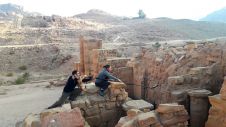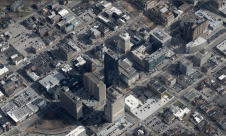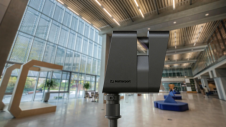ECOLAB 2004 Congress
Remote Sensing and GIS in Amazonian Coastal Ecosystem Study
The ECOLAB 2004 Congress was held in Cayenne, French Guyana, from 30th November to 5th December with the objective of exchanging scientific progress on the management and conservation of Amazonian Coastal Ecosystems. Over a hundred participants from Brazil, French Guyana, Guyana and Venezuela attended and some eighty papers were presented.
The ECOLAB initiative started in 1992 and the 2004 Congress was the eighth of its kind. ECOLAB is a research programme based on the partnership of scientific institutions studying Amazonian coastal regions (see Table). The Amazon is the world’s largest river in terms of freshwater and sediments discharge. The river impacts thousand miles of coastal area in Venezuela, Guyana, Suriname, French Guyana and Brazil and ECOLAB research activities focus on:
- sediment discharge
- coastal hydrodynamics
- mangrove and wetlands ecology
- natural resources
- coastal communities
- urban growth
- epidemics.
Remote Sensing and GIS
Many of the invited technical and poster presentations reported on research done with remote sensing and GIS technologies. Remotely-sensed data used included Landsat 5/TM and Landsat 7/ETM+, SPOT 2, 4 and 5, Envisat MERS and ASAR, NOAA/AVHRR, JERS, ERS-1, Ikonos, SEAWis, TERRA MODIS and aerial radar. Dr Sausen presented the CBERS Satellite Data Catalogue available on the INPE site (http://www. dgi.inpe.br/CDSR/) and on the INPE Remote Sensing Data Center project. One of the objectives of this is to recover the Landsat images tracked by Brazilian antenna since April 1973. Prof. Pedro Walfir presented an overview of remote sensing activities in the area, the availability of CBERS and Landsat images in the region, and the remote sensing laboratories set up here. SPOT Image presented a paper on the implementation of a SPOT/ENVISAT receiving station in French Guyana.
Topics
The main topics addressed by the five technical, and four of the five round-table sessions, were:
- structure and functioning of Amazonian coastal ecosystems
- remote sensing for Amazonian coast monitoring
- dynamics of Amazonian coasts and continental shelf
- coastal Amazonian communities and fishery
- Amazonian coast management.
The fifth round-table topic was public policies and environmental management. The topics of the five invited papers were:
- Ecosystems in mangrove coasts
- Dynamics of the Amazonian coasts
- Five hundred years of history of the Amazonian coast through maps
- Amazonian Cities at the confluence of water
- Knowledge of Amazonian Coas-tal Ecosystems: new scientific borders.
The last three days of the Congress consisted of a scientific field trip to the west of French Guyana; amongst others there was a visit to the Guyana Space Center in Kouru city. The next ECOLAB Congress will be held in 2006 in Macapá, Brazil.

Value staying current with geomatics?
Stay on the map with our expertly curated newsletters.
We provide educational insights, industry updates, and inspiring stories to help you learn, grow, and reach your full potential in your field. Don't miss out - subscribe today and ensure you're always informed, educated, and inspired.
Choose your newsletter(s)
























